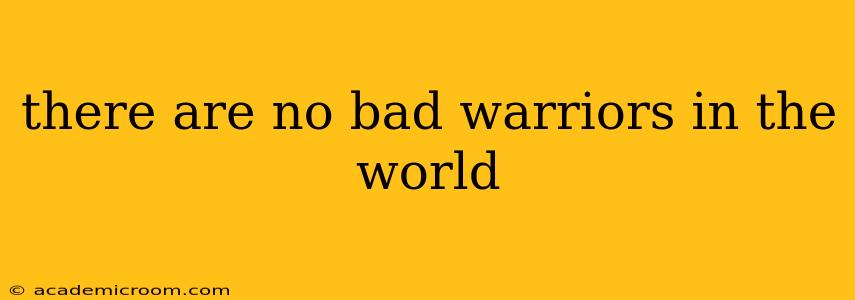There Are No Bad Warriors: Redefining Skill, Mindset, and the Nature of Combat
The statement "There are no bad warriors" is provocative. It challenges our inherent biases towards judging skill and effectiveness solely on battlefield victories. While some might interpret this as a naive statement, a deeper examination reveals a powerful truth about the multifaceted nature of warfare and the warrior's spirit. This isn't about denying the existence of ineffective combatants; it's about redefining what constitutes a "bad" warrior and recognizing the diverse forms of strength and contribution on the battlefield and beyond.
What Does It Mean to Be a "Good" Warrior?
The traditional image of a "good" warrior often centers around physical prowess, tactical brilliance, and a high kill count. However, this is a narrow and ultimately incomplete definition. A truly effective warrior possesses a wider array of qualities:
- Adaptability and Resilience: The best warriors aren't necessarily the strongest or fastest; they are the ones who can adapt to changing circumstances, learn from setbacks, and maintain their composure under immense pressure. This mental fortitude is often more crucial than brute force.
- Discipline and Training: Rigorous training is essential, but it's the discipline to continuously hone skills and adhere to strategy that truly separates exceptional warriors from the rest. This encompasses physical fitness, tactical proficiency, and mental resilience.
- Loyalty and Camaraderie: Warfare is rarely a solitary endeavor. A warrior's ability to build trust, inspire loyalty, and operate effectively as part of a team are paramount to success. Strong bonds foster courage and mutual support.
- Strategic Thinking: Understanding the broader context of battle, anticipating enemy movements, and devising effective strategies are vital for long-term success. Raw power alone cannot compensate for a lack of tactical insight.
- Moral Compass: While seemingly contradictory to the act of warfare, a strong moral compass guides a warrior’s actions, minimizing unnecessary violence and upholding ethical standards even in the face of extreme adversity. This moral fortitude is integral to maintaining a functional and just society even in times of war.
What About Warriors Who Suffer Defeat?
Many might argue that warriors who lose battles are inherently "bad." This is a simplistic and unfair assessment. Defeat in battle can result from a multitude of factors, including:
- Superior Enemy Force: Sometimes, despite valiant efforts and skillful execution, a numerically or technologically superior enemy force is simply insurmountable. This doesn't negate the warrior's courage or skill.
- Unforeseen Circumstances: Weather conditions, unexpected enemy tactics, or logistical failures can all contribute to defeat, regardless of individual warrior capabilities.
- Strategic Shortcomings: Even the most skilled warriors can be hampered by flawed strategies or poor leadership decisions. This emphasizes the importance of a cohesive, well-led fighting force.
- Sacrificial Actions: Sometimes, a warrior's actions, even if resulting in apparent defeat, serve a strategic purpose, such as a delaying action to allow for the retreat of comrades or the destruction of critical enemy equipment.
The Warrior Spirit Transcends Victory and Defeat
The true essence of a warrior lies not in the outcome of battles but in the qualities they embody: courage, resilience, discipline, loyalty, and a commitment to their cause. These qualities are valuable whether on the battlefield or in the pursuit of any challenging endeavor. The "bad" warrior is a myth—a product of a limited and judgmental perspective that overlooks the complexity of human endeavor and the many facets of strength.
Are there Different Types of Warriors?
Yes, absolutely. There are warriors who excel in hand-to-hand combat, others who are masterful strategists, and still others who excel in logistics or support roles. Each type of warrior plays a vital role in the overall effectiveness of a fighting force. A successful army depends on the contributions of diverse skillsets.
How Can We Recognize True Warrior Qualities?
Recognizing true warrior qualities involves looking beyond surface-level indicators of success or failure. Observe a person's resilience, their commitment to training and self-improvement, their loyalty to their comrades, and their commitment to their values. These are the hallmarks of a true warrior, regardless of their role or the outcome of their struggles.
In conclusion, the statement "There are no bad warriors" is not about denying the reality of combat effectiveness. It is a call to broaden our understanding of what it means to be a warrior, to appreciate the diverse forms of strength and contribution, and to recognize the inherent human value of courage, resilience, and commitment, regardless of the outcome of any particular conflict.
